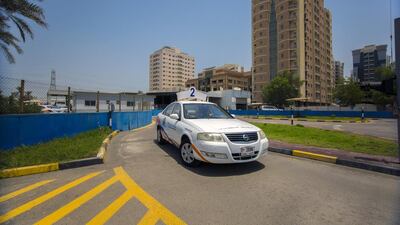DUBAI // Experts have called for longer training periods for learner drivers to improve the quality of driving on the roads.
At present, any trainee driver without prior driving experience is required to take a minimum of 40 practical lessons of 30 minutes each before they can do their test.
Next year, however, the Roads and Transport Authority in Dubai is planning on making lessons 60 minutes long, and it is believed there will be no reduction in the minimum number of practical lessons.
“It is not productive to learn for half an hour,” said Arif Al Malik, director of RTA’s drivers’ training and qualifications department. “One hour of practical lessons is best for both student and instructor.”
“A student would normally take 10 minutes to warm up, such as adjust the seat and review previous lessons, before he or she can start learning a new topic. At the end of the lesson, it would take at least 5 minutes to debrief on what has been learnt.”
The RTA, he said, is keen on adopting an internationally recognised standard of lessons lasting 50 or 60 minutes.
Dr Britta Lang, a traffic psychologist at UK consultancy Transport Research Laboratory, supports extending the time of driving lessons. “The more experience novice drivers have, the lower their involvement in collisions,” she said.
Robert Hodges, chief operating officer at Emirates Driving Institute, said an increase in the number of minimum lessons will help trainees to get enough training and become safe drivers.
“Generally, trainees will not opt themselves to take extra lessons to get more training,” he said. “If training lessons are sufficient, trainees will get an opportunity to practice the skills with relative safety, rather than just get the practice technically.”
At the institute, a student can take the minimum two lessons at 30 minutes each, or one hour per day. A beginner has to take the minimum 40 lessons, or 20 hours in total.
RTA has plans to make driving instructors responsible for deciding when students sit their driving test.
Instructors, who spend a considerable amount of time with students, have a great influence on their driving skills and behaviour.
“The instructor must ensure that students are competent in driving on public roads before submitting for an assessment,” Mr Al Malik said. “This will save time and money for students from failing repeatedly.”
Instructors with higher pass rates will be recognised and awarded, but those with low pass rates will be retrained for better performance. Those who refuse to improve may be subject to a suspension or revocation of their teaching permits, he said.
“Our goal is to produce new drivers with good skills and a positive attitude towards safe driving,” Mr Al Malik said. “An instructor’s quality of teaching is very important, and it is only logical that the instructor must be accountable for a student’s result.”
Mr Hodges said instructors must be held accountable up to a certain point.
“They are responsible for what they are teaching,” he said. “But in most cases, a number of other elements are also factors for getting the test failed, including test phobia and other road users.”
When a student completes their lessons, they must appear for an internal road assessment.
“It [should be] the responsibility of the assessor to ensure a student is ready for the final road test,” Mr Hodges said. “If the student’s skills are found weak, the assessor will recommend required lessons for remedial training and the student will appear again for reassessment, after availing of remedial training.”
Dr Lang welcomed RTA’s suggestion to increase the accountability of driving instructors and school assessors for the test readiness of students.
“It has the potential to improve pass rates, and prevent candidates who are not test-ready from presenting for the test and failing.”
Dino Kalivas, chairman of the driver education and training committee at the International Road Federation, agreed.
“Changes suggested by the RTA reflect advancements in world’s best practice,” he said. “The issue of unprepared drivers presenting themselves for the driving test is problematic. All countries must first prepare learner drivers to be solo drivers, and not be prepared only to pass a road test.”
rruiz@thenational.ae

